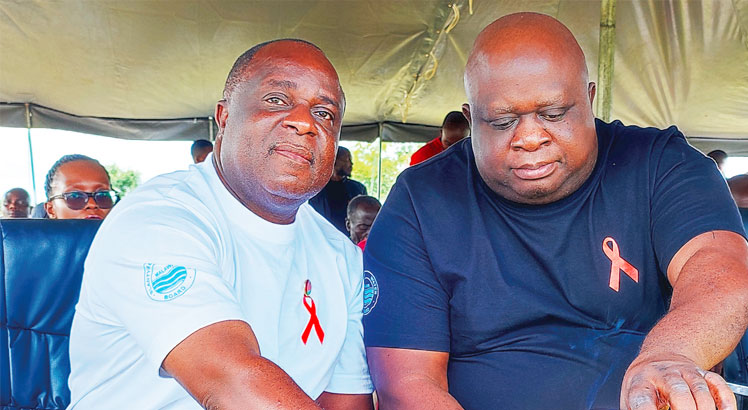HIV isn’t a death warrant
Catherine Malemia has lived with HIV since 1998 when she was 24 years old.
According to the National Aids Commission (NAC), she was among the 13 percent of Malawians aged 15 to 24 who contracted the virus that causes Aids that year.
“For the first three months, I thought my HIV status was a death warrant,” says Malemia. “Considering that Malawians living with HIV were dying at an alarming rate, I wasn’t sure that I would see the light of another day.”
HIV demolishes body defences and exposes infected persons to deadly opportunistic diseases.
Global estimates by the World Health Organization show that Aids claimed 2.3 million lives in 1998 and the pandemic caused 19 percent of deaths in Africa.
“After months of anxiety, I realised that living in denial could not change my HIV status,” says Malemia of Thamangiwa Village in Traditional Authority (T/A) Likoswe, Chiradzulu District.
Accepting the condition helped her not only to seek treatment and care but also to talk about it to release her fear.

She recalls being maligned and ostracised after openly sharing her HIV status.
“I endured rejection and discrimination even from my close friends and relatives,” she says. “Some feared that I would infect them and others expected me to die sooner than later, but months turned into years and I am still healthy.”
Malemia is now 50 years old, living with the virus for more than half of her lifetime.
She has become a go-to person for lessons on everything to do when taking HIV treatment to suppress the viral load to zero and live longer.
“I am now a role model. People flock to my house almost every day for counselling. They want to know how they can live healthy like me,” she says.
Malemia is a preacher who fuses her sermons with tips on the importance of HIV testing, treatment and positive living.
She works as a counsellor with St Joseph Mission Hospital at Nguludi, Chiradzulu.
Malemia warns people living with HIV against having unprotected sex with multiple partners after knowing their status “as this kills fast”.
Instead, she advises them to use condoms and take antiretroviral (ARV) drugs as directed by health workers to live healthy and longer.
Recently, Malemia delivered an inspirational talk during the Blantyre Water Board (BWB) belated World Aids Day commemoration at Nguludi Pumping Station in Chiradzulu.
T/A Likoswe saluted her for putting a human face to HIV and Aids, which has claimed lives of hundreds of thousands in Malawi life
The traditional leader observed that despite some challenges in the fight against HIV, his community is making strides to contain the spread of the virus.
He stated: “People like Malemia remind us that HIV is preventable and we have seen people living positively for over 30 years.
”So we, community leaders, have a pivotal role to play in the fight against HIV and Aids. Ending HIV infections and Aids-related deaths starts with community participation and we need support from various players to enhance sensitisation campaigns and complement the government’s efforts to end the HIV and Aids epidemic by 2030.”
BWB board chairperson Joe Ching’ani observes that no government institution has been spared from the impact of HIV and Aids.
“Due to a policy that has been put in place, we can control the effect. A healthy workforce is a productive workforce,” he says.
The Ministry of Health reports that the country registered 15 000 new cases in 2022, a 73 percent decline from the 56 000 registered in 2010.
The country has also registered a 65 percent reduction in annual Aids-related deaths from 32 000 to 11 100 during the period.
The official figures show that HIV prevalence in people aged 15 and above has decreased from 10.6 percent to 7.7 percent.
Amon Nkhata, director of health and inter-governmental coordination in the ministry, attributed the declines to strong partnerships between the government and the donors, civil society, faith community, the private sector and community-based change agents.
He said: “Over two decades ago, the HIV and Aids pandemic seemed unstoppable. Yet, through relentless efforts, we have achieved significant milestones in the fight against HIV, with notable reductions in new infections and Aids-related deaths.”
The National Strategic Plan on HIV and Aids, developed with support from the Global Fund, outlines the roles of various stakeholders in achieving Sustainable Development Goal three to eliminate HIV and Aids by 2030.
NAC reports that by June 2022, about 927 500 people had been diagnosed with HIV, with 920 226 put on treatment and 874 225 taking the life-prolonging drugs consistently until their viral load was suppressed.
Today, Malawi is on the cusp of achieving the UN targets to ensure 95 percent of all people living with HIV know their status, 95 percent of them are on treatment and 95 of those on treatment are virally suppressed.
The 2021 Malawi Population-based HIV Impact Assessment indicates that 88 percent of all people with HIV knew their status, 98 percent of these were receiving ARVs and the viral load of 97% of those on treatment was undetectable.
The nationwide study shows the country has more than halved its HIV prevalence to about eight percent and now half the death rates that overwhelmed the public health system a decade ago.






What i do not realize is in fact how you are no longer actually much more well-favored than you might be right now. You’re very intelligent. You recognize thus considerably in relation to this topic, made me in my view believe it from numerous numerous angles. Its like men and women are not fascinated until it is one thing to do with Lady gaga! Your own stuffs excellent. All the time handle it up!